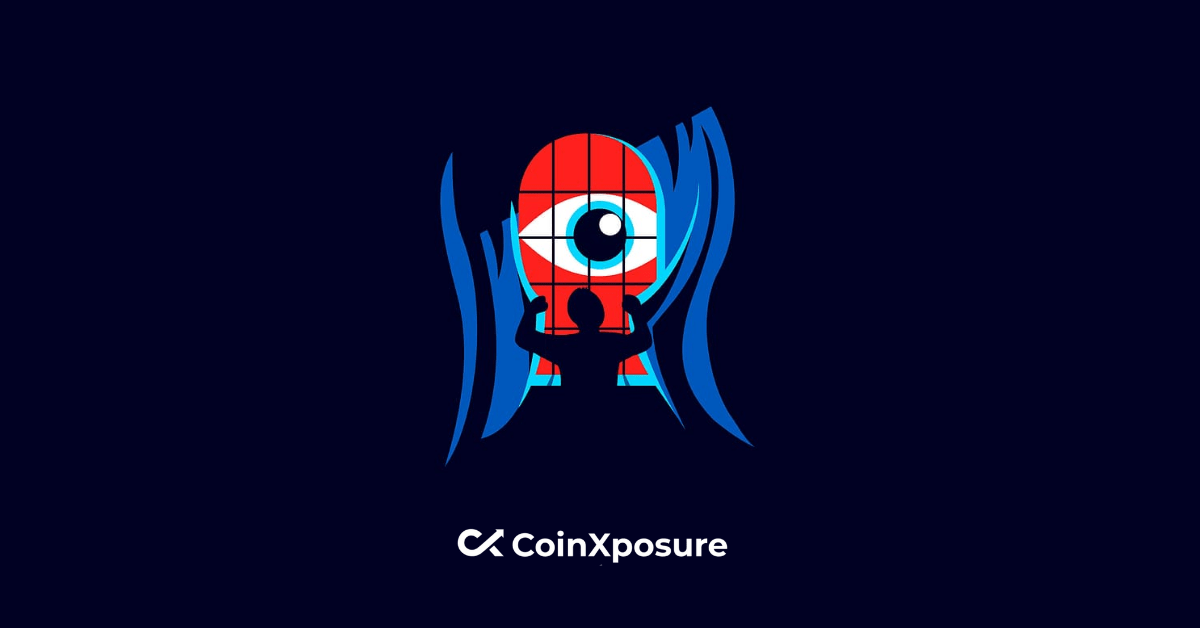
Protecting Your Identity: Best Practices for Crypto Privacy
Cryptocurrencies are unique due to their decentralized and digital nature, which also increases the level of risks associated with them. This article discusses some best practices for crypto privacy to ensure the safety of your identity.
The phrase “crypto” might make you feel that your transactions are private; however, this is a frequent fallacy.
Every Crypto transaction is recorded on a massive public ledger, allowing anybody to trace them back to their origins easily.
For example, suppose you download and configure a MetaMask wallet.
Unless you received your original cryptocurrency from mining or selling something, you would most likely buy Ethereum or another cryptocurrency with fiat currency.
As a result, any transactions you do with Ethereum can be traced back to the processor that saw your credit card or bank account.
Web3 applications make problems more complicated. For example, many Web3 developers use Infura and other API providers to interact with blockchains.
However, as MetaMask users learned, these services can capture and retain IP addresses and wallet information. As a result, someone might read these logs and match your wallet to your identity.
Of course, crypto privacy may not be an issue for most cryptocurrency users. Many people are willing to sacrifice privacy for convenience and ease of use.
In many ways, these patterns mirror those of the broader Internet, where most users were eager to transition from anonymous listservs and forums to social media platforms where they could use their real identities.
Let’s see what crypto privacy is really about.
What is Crypto Privacy?
Crypto privacy refers to keeping your financial transactions and personal information private when dealing with cryptocurrencies. It’s like protecting your online banking activity from prying eyes.
Now, when it comes to cryptocurrency, crypto privacy can be challenging. Some cryptocurrencies, such as Monero and Zcash, are mainly intended to value privacy.
They employ advanced cryptographic algorithms to conceal information such as who is sending money to whom and how much, making it incredibly difficult to track these transactions.
However, Bitcoin, the most well-known cryptocurrency, is not as private by default. Its transactions are recorded on a public ledger blockchain, so anybody with your wallet address can view the transaction details.
However, there are ways to improve Bitcoin’s privacy, such as adopting techniques like CoinJoin or choosing privacy-focused wallets.
Crypto privacy is similar to drawing a digital curtain around your financial transactions, guaranteeing that your money affairs remain private and your personal information is protected from prying eyes.
Remember that picking the correct cryptocurrency and taking extra precautions are critical for preserving crypto privacy in the crypto realm.
Best Practices for Crypto Privacy
To ensure the safety of your identity in the crypto space, here are some of the best practices for crypto privacy.
- Using a secure wallet
- Protect your recovery phrase
- Implement strong passwords
- Enable two-factor authentication
- Stay alert about phishing attacks
- Keep your public address private
- Regularly update your wallet software
- Beware of social engineering scams
- Always update your knowledge
- Use a VPN
- Diversify your holding
- Create a backup and recovery plan
Using a Secure Wallet
Choosing a reputable and secure wallet is the first and most crucial step in preserving crypto privacy. There are two sorts of wallets: hardware and software.
Hardware wallets like the Ledger Nano S and Trezor provide an offline, cold storage solution, making them highly secure. However, while they are secure, they are minor and easily misplaced.
Software wallets are available in several formats, including mobile, desktop, and online. Be careful to choose one from a trusted supplier, and always check their security features and reputation.
We recommend utilizing a hardware wallet over a software wallet because selecting the incorrect one is less dangerous.
Protect Your Recovery Phrase
The recovery phrase is a lifeline if you lose access to your hardware wallet. It’s like having a spare key to your cryptocurrency.
When you set up a hardware wallet or another type of cryptocurrency wallet, you are typically given a list of words, usually 12 or 24, in a particular order. This is your recovery phrase, often called a seed phrase.
Now, here’s the thing: that phrase is exceptionally crucial. It is your lifeline if you ever lose access to your wallet or have it stolen. So treat it like your bank’s PIN code or even more securely.
First, record it on a piece of paper. Don’t merely store it on your computer or phone since if they are compromised, your recovery phrase may also be compromised. Next, store that piece of paper safely.
Never reveal your recovery phrase to others. It’s only for your eyes, and keep in mind that anyone who obtains your recovery phrase can access your cryptocurrency, so use it as a treasure map for your digital asset.
Implement Strong Passwords
Another best practice to ensure crypto privacy is the implementation of strong passwords. Use secure and unique passwords when setting up Crypto exchanges or wallets accounts.
So, what makes a strong password? It should be a combination of upper and lowercase letters, digits, and special characters. Avoid using readily guessed passwords such as “12345” or “password.”
Make it long and complex. The more unpredictable, the better. Here’s a golden rule: never use the same password on several accounts.
Finally, it would be best if you considered using a password manager. It’s like having a highly secure vault for all of your passwords. It will generate and remember strong ones for you, so you don’t have to.
Enable Two-Factor Authentication
Two-factor authentication provides an additional layer of security for your Crypto accounts. Most cryptocurrency exchanges and wallet providers offer 2FA as an option; if yours does, we strongly recommend using it.
2FA often needs you to supply a one-time code produced on your mobile device or obtained via email in addition to your password.
There are additional two-factor authentication programs available, such as Google Authenticator. This extra step makes it substantially more difficult for unauthorized users to access your accounts.
Stay Alert About Phishing Attacks
Phishing is a frequent strategy for thieves to obtain Crypto holdings.
These scams involve deceiving people into disclosing their private keys or credentials, clicking on a link, and entering their information on a fraudulent platform.
Be wary of unsolicited emails or messages requesting critical information to protect yourself. Always check the credibility of a website or service before submitting your information to an online form.
Keep Your Public Addresses Private
Public cryptocurrency addresses, like your bank account numbers, are intended to be shared when receiving cash. However, posting them publicly can reveal your transaction history to anyone with your address.
Be careful who you share your information with, and consider using various addresses to increase privacy.
For example, one is for accepting money from friends, one is for online shopping, and another is for more private transactions.
In this manner, you may categorize your cryptocurrency actions, making it more difficult for others to piece together your financial history.
Regularly Update Your Wallet Software
Crypto wallets and your device’s operating systems may contain vulnerabilities that fraudsters might exploit.
Regularly update your wallet software and device operating systems to ensure you have the most recent security patches and features. Failure to do so may make your assets vulnerable to assault.
You should also regularly update the software on your computer, phone, and any other electronic device to ensure no vulnerabilities can be exploited on other platforms.
Beware of Social Engineering Scams
Social engineering attacks entail manipulating people into disclosing sensitive information. Hackers may imitate reputable entities or utilize personal information acquired from many sources to earn your trust.
Always verify the identities of people or companies you’re dealing with, especially if they want access to your cryptocurrencies.
If you receive an email from a friend or family member, we recommend phoning them at the number you have saved for them to ensure it is truly them.
Even still, we recommend only giving money to that person if you have confirmed their identification.
Always Update Your Knowledge
Knowledge is your best protection. Keep up with the newest crypto scams, security dangers, and best practices. Check for security-related updates regularly and apply them as soon as possible.
Participating in the crypto community and forums can provide valuable insights and advice for remaining safe.
The more you know, the better prepared you are to protect your investments.
Remember that cryptocurrency is a rapidly evolving technology, so what was true yesterday may not be true tomorrow. Make learning a continual adventure.
By educating yourself, you protect your investments and make better judgments, which will benefit your cryptocurrency journey in the long term.
Use a VPN
For added crypto privacy, use a VPN. A VPN, or Virtual Private Network, functions similarly to a covert internet tunnel.
It can be an effective tool for protecting your privacy when working with cryptocurrency. This is how it works.
When you use a VPN, your internet connection is routed via a secure server in another location.
This covers your genuine IP address, making it much more difficult for others to trace your online actions back to you. It’s like using a disguise while browsing the Internet.
So, whether accessing your cryptocurrency accounts or doing transactions online, employing a VPN might provide additional security. It’s essential when connecting to public Wi-Fi networks, which are susceptible to attacks.
Remember that not all VPNs are equal, so select a trustworthy one that does not log your data and offers robust encryption.
Using a VPN is effectively like giving oneself a digital cloak of invisibility, which helps to keep your cryptocurrency transactions hidden and secure.
Diversify Your Holdings
Diversifying your cryptocurrency holdings can lessen the risk associated with a single asset, which is especially significant if that asset experiences problems in the future (such as the FTX coin).
This method ensures that a potential loss in one investment does not wipe out your entire portfolio. Diversification also includes the exchanges and wallets you use.
Distributing your assets over multiple systems reduces the likelihood of a catastrophic breach or failure on a single platform.
Create a Backup and Recovery Plan
Finally, have a backup and recovery strategy in place. If you lose access to your cryptocurrency assets despite all safeguards to ensure crypto privacy, you must understand how to recover them.
Backup information should be kept in a secure location, and a trustworthy individual should know how to retrieve it if something happens to you.
Most wallet providers include recovery seeds or phrases that can be used to restore your wallet in case of loss.
Conclusion
Protecting your identity and valuables should be your number one responsibility in the exciting world of cryptocurrency.
Following these crypto privacy best practices allows you to reap the benefits of digital currencies while reducing the dangers connected with cyber threats.
Remember that in the Crypto space, security is not a choice. It is a must. Stay watchful and aware, and protect your crypto identity from prying eyes.





